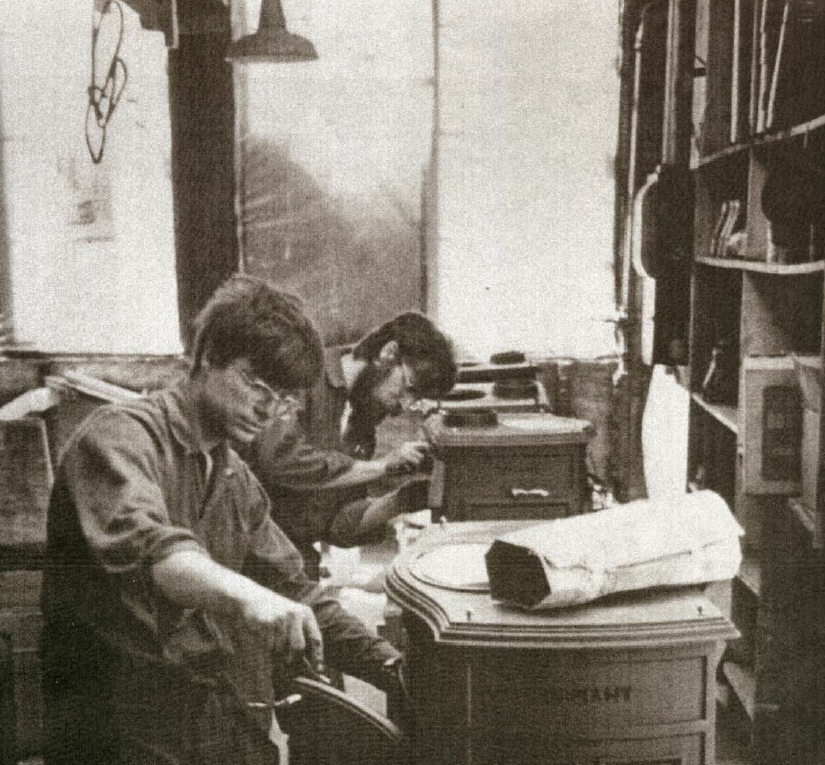Written by Stephen Morris and originally published in The White River Valley Herald https://www.ourherald.com/articles/remembering-uncle-duncle/
Duncan Syme passed away on May 2, 2024. He was the stuff of legends. He was many things, including the designer of the Vermont Castings flagship, the Defiant woodstove.
The story begins ...
Three guys meet in a bar in Crested Butte, Colorado. It is 1970, and the United States is embroiled in the Vietnam War, trying to comprehend the assassinations of not one, not two, but three of the country’s most charismatic leaders. The guys are in search of their paths in life. Wouldn’t it be great, they muse after a few beers, to follow Joni Mitchell’s advice to “get back to the garden” and to find a way to do something significant … something real and tangible that they could create with their own hands?
Five years later, the three have taken different paths. One, W Mitchell (no period, just "W") is now badly disfigured and a quadriplegic owing to two separate accidents, one on a motorcycle the other on a plane he was piloting. It is small consolation that he is awarded a large financial settlement by the manufacturer of his motorcycle. He lives in, and will eventually become mayor of Crested Butte.
The other two are now linked by marriage … brothers-in-law. Murray Howell has taken the proven path to wealth on Wall St. Duncan Syme in Warren, Vermont where he is barely eking out a living as an architect. Howell hates his job and wants out. Syme likes his profession and loves his community of free-thinking hippie/ski bums in the Mad River Valley, like many in the community, need to invent gainful employment to escape the most hardscrabble existence.
Community members play hard. "If someone wants to play hockey at two in the morning," remembers one, "You better reach for your skates." Fanciful, creative excess rules the day. Want to improve the ice service? Invent a wood-fired Zamboni. Want to build a house? Grab some nails. The houses on Prickly Mountain and the Warren Fourth of July Parade remain as reminders of these halcyon days. The Zamboni, alas, is reportedly at the bottom of the pond where it fell through the ice.
The young, ambitious hipsters burn a lot of wood, and the Arab Oil Embargo of 1973 inspires a competition to develop a more efficient woodstove. Several promising designs emerge. Now the challenge becomes how to evolve from concept to reality. Syme's design combines the airtight efficiency of Scandinavian stoves with the traditional American aesthetics of a Franklin stove. Working in concert with fellow architect and Mad River refugee Vance Smith the Defiant woodstove emerges. All that is missing are the financial resources and business acumen to get from here to there. Howell and Syme decide it is time to revisit their old drinking buddy in Crested Butte, W Mitchell. No period, just "W."
Inexpensive manufacturing space is found in Randolph, Vermont, in a former foundry by coincidence. The first Defiant woodstove, named both for its ability to defy the cold of winter and as testament to a legendary defender of America’s Cup, made its debut in 1976. For several years the company grew organically, but fitfully, as is common with business start-ups, as did every other woodstove company in the country including those of the Mad River start-ups. Growth was limited by the company's dependence on castings imported from Europe. This restriction, ironically, turned out to be a blessing-in-disguise, as the company's stoves were always back ordered for weeks at a time, creating an aura of desirability and a fanatically loyal customer base.
While Howell was notoriously shy and gruff, Syme did not mind stepping provocatively into the limelight, appearing at festive gatherings in full Scottish clan regalia or a trademark blue blazer, bow tie, and straw boater. Duncan was, in Vermonter terms, "quite a riggin'."
When the inevitable industry consolidation occurred in the early 1980s Vermont Castings, fueled by innovative design and engineering, fanatical attention to manufacturing quality, uncompromising customer service, and pent-up demand was able to maintain its momentum while competitors slid back. With a state-of-the-art foundry in Randolph and, later, an enameling plant in Bethel, Vermont Castings was poised for growth. When the industry dust settled by the mid-80s, Vermont Castings had become the worldwide leader in woodstove manufacturing.
Murray Howell, sadly, passed away much too young in 1983. He missed the entire ride, but he was there for the best part. After he was gone, the company’s trajectory was filled with bumps and twists, but always headed onward and upward, finding its center in the clarity of the original vision.
In an era when America forgot how to make things, Vermont Castings stoves were made by bearded, flannel-shirted Vermonters. While manufacturing facilities were proliferating in whatever foreign land had the cheapest labor, Vermont Castings built a state-of-the-art foundry and enameling plants in the shadows of the Green Mountains. While standards of quality universally were subjugated to the priorities of the bean counter, Vermont Castings stayed true to the exacting standards set by its founders. Best of all, they maintained the youthful idealism of their conversations in Crested Butte.
Howell once said “I’m as creative as the sole of your shoe, and Duncan is as organized as a bowl of spaghetti.” With a roster of accomplishments that includes the Defiant, the Vigilant, the Resolute, and even the Vermont Castings Owners Outing, Duncan Syme transformed that tangled bowl of spaghetti into a memorable and remarkable feast of a career.
Epilogue: While Howell and Syme have, sadly, passed W Mitchell, now 81, eventually ran for Governor of Colorado, and, following that, became a highly sought-after inspirational speaker on the corporate circuit. His message often paraphrases the quote of Epictetus: "It's not what happens to you, but how you react to it that matters." He lives with his wife in Santa Barbara, California and has a second home in Hawaii.


